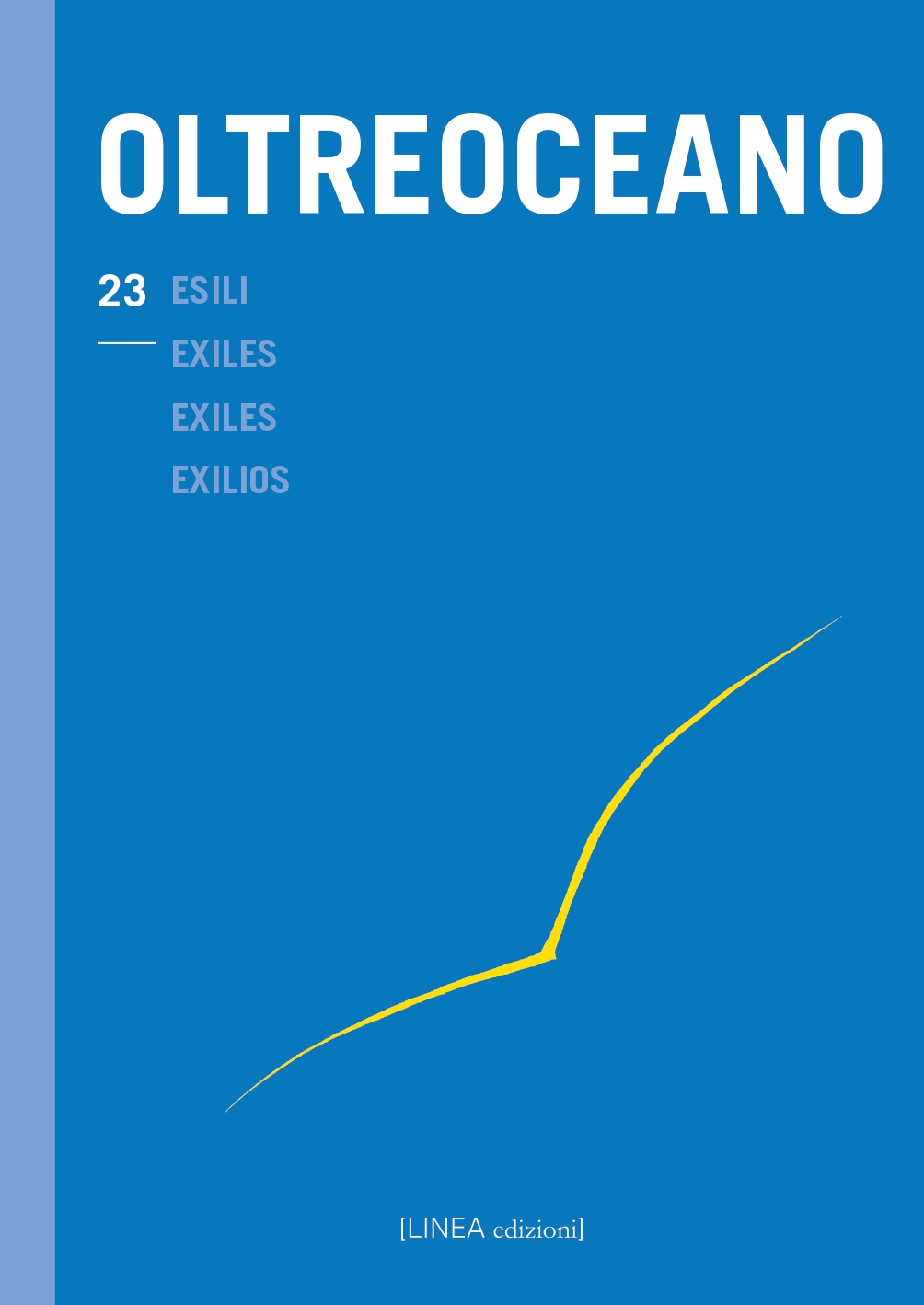“Every time he comes in he robs me”: The Parasitic Chains of Israel Potter’s Exile
DOI:
https://doi.org/10.53154/Oltreoceano99Keywords:
Herman Melville, Israel Potter, Parasite, Exile, Body politicAbstract
Along with recent Melvillian scholarship (Irigoyen 2018, Lazo 2022), the present essay analyzes the representation of the exile in Herman Melville’s Israel Potter: or, His Fifty Years of Exile (1855), by focusing on the ways in which the geographical dislocation of American citizens abroad transforms their position within the body politic and the social contract established after the end of the American Revolution. In particular, the present analysis argues that the experience of exile is crucial in generating an imbalance between state and people, turning the mutually beneficial relationship that ties them together into a form of exploitation of the former over the latter. In other words, while the social compact (represented in the body politic) is theoretically configured as a relation of symbiosis between the two entities, the exile experience transforms such a reciprocity into a parasitical tie.
The narrative function of the parasite theorized by scholars such as Michel Serres (1980) and Cynthia Damon (1997) has been applied to Melville’s work by Anders M. Gullestad (2022), who focuses on the parasitical chains related to food. Here, the notion is applied to the dynamics of power and it is used to describe the relationship between the state and the persons in exile, configuring the political institutions as parasite, and the people as host. The essay subverts the relationship between parasite and host, identifying Israel Potter as the host during his life in exile, and the United States and British governments as parasites, thus suggesting Melville’s distrust towards the structures of power of his age. In other words, the present analysis grounds on Melville’s disillusionment towards the political scenario of the time and argues that Israel epitomizes the exploitation performed by the political institutions towards the body politic of the time. Two episodes will be examined: first, Israel’s stay in Paris and his relationship with Benjamin Franklin and, second, Israel’s exile in England.
Downloads
References
Baker, A. (2008): What to Israel Potter is the Fourth of July?: Melville, Douglass, and the Agency of Words. Leviathan: A Journal of Melville Studies, 10, 2, pp. 9-22.
Brown, N.E. & Gershon, S.A. (2020): Introduction. In Brown & Gershon (Eds.), Body Politics (pp. 1-3). New York: Routledge.
Castronovo, R. (1995): Fathering the Nation. American Genealogies of Slavery and Freedom. Berkely: University of California Press.
Damon, C. (1997): The Mask of the Parasite. A Pathology of Roman Patronage. Ann Arbor: The University of Michigan Press.
Deleuze, G. & F. Guattari (1987): A Thousand Plateaus. B. Massumi (Transl. by). Minneapolis: University of Minnesota Press.
Derail, A. (1992): Melville’s Leviathan: Moby-Dick; Or, The Whale and the Body Politic. In V. Sachs (Ed.), L’Imaginaire-Melville. A French Point of View (pp. 23-31). Saint-Denis: Presses universitaires de Vincennes.
Everett, W. & Wagstaff, P. (2004): Cultures of Exile: Images of Displacement. New York: Berghahn Books.
Gullestad, A.M. (2022): Melvillean Parasites. Bergen: Cappelen Damm Akademisk.
Hay, J. (2016): Broken Hearts: Melville’s Israel Potter and the Bunker Hill Monument. The New England Quarterly, 89, 2, pp. 192-221.
Herzogenrath, B. (2010): An American Body | Politic. A Deleuzian Approach. Hanover: Darthmouth College Press.
Irigoyen, E. (2018): Form and Exile in Israel Potter: Reading (and Writing on) the Maps in Franklin’s Room. Leviathan: A Journal of Melville Studies, 20, 3, pp. 15-24.
Lazo, R. (2020): Israel Potter Deported. Leviathan: A Journal of Melville Studies, 22, 1, pp. 146-165.
Lazo, R. (2022): Refugee, Exile, Alien: Israel Potter’s Migrant Turns. In W. Kelley & C. Ohge (Eds.), A New Companion to Herman Melville (pp. 113-122). Hoboken: Wiley Blackwell.
Levine, R.S. (2014): Chronology of Melville’s Life. In R. Levine (Ed.), The New Cambridge Companion to Herman Melville. New York: Cambridge University Press.
Levine, R.S. (2020): What is the White American? Race, Emigration, and Nation in Melville’s Redburn. J19: The Journal of Nineteenth-Century Americanists, 8, 1, pp. 97-122.
Mardorossian, C.M. (2002): From Literature of Exile to Migrant Literature. Modern Language Studies, 32, 2, pp. 15-33.
Melville, H. (1855): Israel Potter: or, His Fifty Years of Exile. New York: G.P. Putnam & Co.
Serres, M. (1980): Le Parasite. Paris: Grasset.
The Declaration of Independence (1776). Retrieved from https://www.archives.gov/founding-docs/declaration-transcript (Last accessed on 28/08/2024).
Downloads
Published
How to Cite
Issue
Section
License

This work is licensed under a Creative Commons Attribution-NonCommercial-ShareAlike 4.0 International License.
The authors undertake to comply with the following conditions, which are considered accepted at the time of submission of their contributions.
The sending of a text implies that it is unpublished and not submitted to be published elsewhere.
1. If accepted, the author shall confer on the publisher the right to publish and distribute it both in paper form and in the online electronic edition. The published articles will be downloadable and made available in open access.
2. Provided that it correctly indicates that the first publication took place in the journal Oltreoceano. Rivista sulle migrazioni the author has the right to: a) reproduce the article in separate extracts or collected in a volume; b) publish the article on their personal website or teaching site provided that these sites are of a non-commercial nature; c) deposit the article in online archives of a non-commercial nature, linked to the institution they belong to or as part of projects for the non-commercial dissemination and open access of scientific works.
The use of contributions by third parties, for commercial or otherwise unauthorized purposes, is not allowed. The publisher declines all responsibility for the unauthorized use of the material published in the journal.












